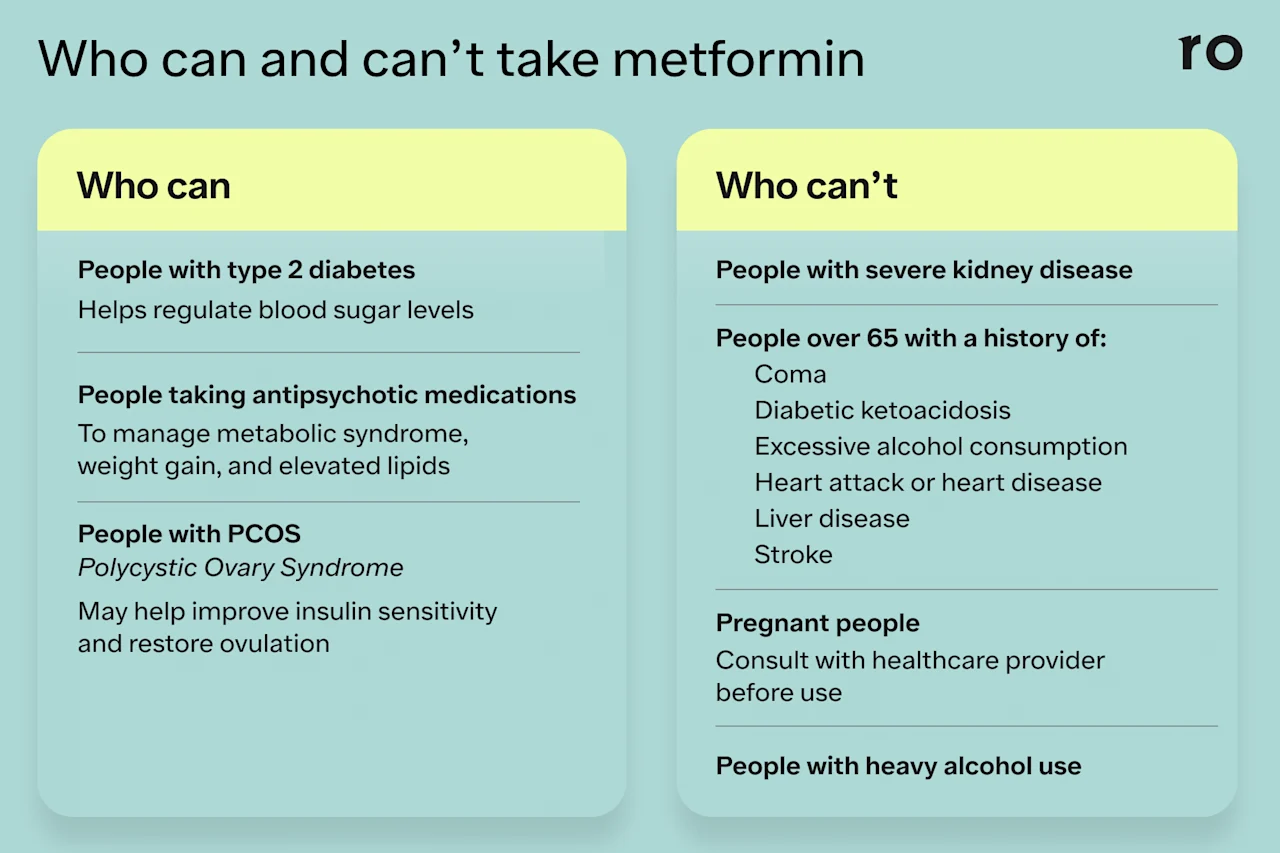Key takeaways
Metformin is a medication approved for treating type 2 diabetes, but healthcare providers sometimes prescribe it off-label for other conditions and weight management.
Metformin helps manage blood sugar, increases insulin sensitivity, suppresses appetite, reduces visceral fat, and benefits gut health—all factors that may help with weight loss.
Metformin’s weight loss benefits are modest, but it may help alleviate some complex factors that contribute to obesity or overweight and make it easier to lose weight overall.
Here's what we'll cover
Here's what we'll cover
Key takeaways
Metformin is a medication approved for treating type 2 diabetes, but healthcare providers sometimes prescribe it off-label for other conditions and weight management.
Metformin helps manage blood sugar, increases insulin sensitivity, suppresses appetite, reduces visceral fat, and benefits gut health—all factors that may help with weight loss.
Metformin’s weight loss benefits are modest, but it may help alleviate some complex factors that contribute to obesity or overweight and make it easier to lose weight overall.
Losing weight and keeping the weight off can be challenging, no matter who you are. Some health conditions—including obesity, type 2 diabetes, and polycystic ovary syndrome (PCOS)—can make weight loss more difficult because they disrupt the way your body stores food and uses it for energy.
If you’ve researched weight loss methods before, you may have seen information about a diabetes drug called metformin. Though metformin wasn’t designed as a weight loss drug, research shows it may make losing weight easier for some people.
In this article, we’ll explore how metformin works, its potential benefits for blood sugar control and weight loss, as well as side effects and safety precautions.
What is metformin?
Metformin is a prescription medication approved for the treatment of type 2 diabetes that helps to lower blood sugar levels when diet and exercise alone are not enough to move the needle. The American Diabetes Association (ADA) considers metformin the preferred first-line diabetes drug for people 10 years or older.
Metformin is a man-made derivative of guanidine, a compound in the French lilac plant (also called goat’s rue). Metformin comes in two forms: tablet or liquid solution, both taken by mouth.
Metformin is available as a generic or under the following brand names:
Riomet (liquid solution)
Fortamet
Glucophage
Glumetza
What is metformin used for?
Although the Food and Drug Administration (FDA) has only approved metformin for treating type 2 diabetes, healthcare providers also prescribe metformin off-label for several other purposes.
Off-label uses of metformin:
Gestational diabetes (diabetes diagnosed during pregnancy)
Polycystic ovary syndrome (PCOS)
Type 2 diabetes prevention (in people with prediabetes)
Weight management, including for people experiencing weight side effects from taking antipsychotic medications
How metformin works
Metformin helps lower blood glucose (blood sugar) levels, but it may also help with weight loss. Here’s a closer look at the mechanism of action for metformin and how it may aid in weight loss for certain people.

Metformin reduces glucose production in the liver
Metformin works by suppressing gluconeogenesis, which is when your liver produces glucose, raising blood sugar. Excessive gluconeogenesis means your body is producing glucose it doesn’t need and can’t use. If the body can’t use glucose, it gets stored as fat.
Metformin increases insulin sensitivity
Metformin helps make you more insulin-sensitive by activating AMP-activated protein kinase (AMPK). AMPK activation facilitates glucose metabolism and enhances the way your cells uptake glucose. This lowers your blood sugar and insulin levels. High insulin levels in the blood (hyperinsulinemia) fuel fat storage, so reducing hyperinsulinemia can help with weight management.
Metformin slows glucose absorption in the intestines
Metformin also helps by inhibiting sodium-glucose cotransporter 1 (SGLT1), and this process helps reduce glucose absorption in the small intestine. This also keeps glucose levels in check and helps prevent blood sugar spikes, which contribute to insulin resistance. People with prediabetes and type 2 diabetes have insulin resistance. Obesity and insulin resistance share connections.
Metformin reduces appetite
Metformin plays a role in increasing certain hormones and molecules in the body that help control hunger and fullness. It increases lac-phe, a molecule that exercise tends to boost. Lac-phe helps reduce hunger.
The medication also increases glucagon-like peptide-1 (GLP-1), a gut hormone that helps control blood sugar, slows gastric emptying, and decreases hunger signals to the brain. Metformin boosts growth differentiation factor 15 (GDF15) expression, a peptide hormone that helps reduce appetite.
The medication also reduces leptin resistance, which is common with obesity and overweight. Fat tissue produces the hormone leptin, which helps control hunger. However, high levels of leptin from increases in fat tissue can cause leptin resistance, where the body isn’t as responsive to the hormone. Metformin helps lower leptin levels.
Metformin reduces visceral fat
Visceral fat is the type of fat that surrounds our internal organs, and too much can be dangerous. According to human and animal studies, metformin may reduce visceral fat by boosting the oxidation (breakdown) of liver fat and increasing thermogenesis, the body’s way of burning calories to produce heat.
Metformin improves the gut microbiome
Our gut microbiome includes all the bacteria and fungi that live in the gastrointestinal tract. Metformin has beneficial effects on your gut microbiome, and these effects can help with weight management and blood sugar control.
Metformin increases the amount of beneficial bacteria and decreases others that may have a negative effect. Metformin also boosts the production of short-chain fatty acids (SFCAs). The bacteria in your gut ferment the fiber from your diet to produce SCFAs. These SCFAs then increase the production of GLP-1, which aids in weight management.
Metformin may help your cells work better
You know the saying: Mitochondria are the powerhouses of our cells. The more mitochondria we have and the better they work, the more efficient our cells are at converting the nutrients we eat into usable energy.
Mitochondrial dysfunction means mitochondria are having trouble doing their jobs. This dysfunction leads to inflammation, which can contribute to obesity and vice versa. Metformin improves mitochondrial function and combats inflammation.
Metformin and weight loss: is it effective?
The question remains: does metformin help you lose weight? The answer is maybe. There are some groups of people in which metformin shows clear weight benefits—but it isn’t a “magic pill.”
Metformin does not replace the need for a balanced diet and adequate physical activity. At the same time, obesity is a complex chronic condition, and sometimes lifestyle changes alone are not enough to spur weight loss.
Early research on metformin was limited to people with type 2 diabetes. In those studies, participants who took metformin saw small weight loss benefits versus placebo or other diabetes medications. Other studies found metformin treatment to be “weight neutral,” meaning that people neither gained nor lost weight while taking it.
An older study from 2001 looked at the potential weight impacts of metformin in people with diabetes and morbid obesity (which this study identified as a body mass index, BMI, of 30 and above). That study found significant weight loss and a reduction in waist size after 28 weeks of taking metformin when combined with a balanced diet and exercise. The results also showed that metformin may reduce the risk factors for coronary heart disease, including high fasting insulin, leptin, and low-density lipoprotein (“bad”) cholesterol.
Despite these promising outcomes, drawing any conclusions about metformin’s effectiveness for weight loss from this particular study is difficult. The sample size was small (only 31 participants), and the researchers didn’t include a placebo group.
Even in studies that show weight loss with metformin, the results are modest.
One of the most extensive studies to date, performed by the Diabetes Prevention Program (DPP) and published in 2012, tested metformin in people with prediabetes. In that study, people randomly assigned metformin lost an average of 2% of their body weight.
In that same study, 29% of people taking metformin daily lost greater than or equal to 5% or more of their initial body weight by the end of the first year, compared with 13% of people in the placebo group. About 26% of the metformin and 14% of the placebo groups had lost greater than or equal to 5% of their initial body weight at the end of year two.
Participants’ waist circumference didn’t change much between years one and two; however, the overall weight loss results were superior to those in the placebo group. What’s more, those who lost 5% or more of their body weight were more likely to have maintained the loss at a 15-year follow-up.
One study from 2013 followed 154 people with obesity or overweight who took metformin for six months. Participants overall lost weight, and those with more severe insulin resistance lost the most weight. A 2018 review found that in 11 of 14 studies, metformin showed a greater reduction in weight and BMI when compared to placebo.
Takeaway: does metformin cause weight loss?
The short answer is that it can, but weight loss is usually modest.
According to available research, weight loss on metformin does occur, though the medication likely won’t produce dramatic results. However, metformin’s health benefits for blood sugar regulation and insulin sensitivity, appetite control, the gut microbiome, and mitochondrial function, which may help boost overall health.
Is metformin safe?
Metformin has a good safety profile. The DPP study, which looked at long-term safety, found no significant safety issues.
Even though metformin is considered safe, some people should not take this medication. This section explores who can take it, who shouldn’t, side effects, medication interactions, and more.

Who can take metformin?
In addition to those with type 2 diabetes, other people may benefit from metformin.
People who use antipsychotic medications
Some people taking antipsychotic medications may develop a condition called metabolic syndrome. Signs of metabolic syndrome include weight gain and elevated triglycerides and cholesterol, among others.
In one study of people new to antipsychotics, those taking metformin saw significantly reduced weight gain, lower BMI, and improved insulin sensitivity.
People with PCOS
If you have PCOS, you may benefit from taking metformin. Characteristics of PCOS often include insulin resistance, weight gain, and hyperandrogenism, which is an excess of androgen hormones such as testosterone. PCOS can disrupt ovulation and lead to infertility.
Some research indicates that metformin may help restore ovulation by boosting insulin sensitivity. However, we need more research on whether metformin can aid with weight loss for people with PCOS.
Who can’t take metformin?
Metformin has a black box warning from the FDA and also comes with several warnings for certain groups of people.
You should not take metformin if you have severe kidney disease. Metformin may contribute to a life-threatening condition called lactic acidosis, which is the buildup of lactic acid in the bloodstream. This condition can affect cardiac output (how much blood your heart pumps per minute) and lead to organ failure.
If you are over 65 and have experienced any of the following, metformin might not be safe for you:
Coma
Diabetic ketoacidosis (blood sugar so high that it required emergency treatment)
Liver disease
Stroke
Tell your healthcare provider if you are pregnant or plan to become pregnant before taking metformin. If you become pregnant while taking metformin, inform your provider as soon as possible.
Other conditions may affect your ability to take metformin. Tell your provider if you have had a serious infection, diarrhea, fever, or vomiting just before or after starting treatment.
Your healthcare provider will help you determine if metformin is right for you. Be sure to be honest about your drinking habits, as alcohol consumption increases your risk of lactic acidosis.
Side effects of metformin
Metformin is generally well-tolerated, but adverse effects can happen. The most common side effects of metformin include:
Asthenia (weakness)
Diarrhea
Nausea/Vomiting
Flatulence (passing gas)
Discoloration (yellowing) of the fingernails or toenails
Constipation
Headache
Indigestion
Heartburn
Metallic taste
Metformin may also cause a vitamin B12 deficiency over time because it potentially interferes with the absorption of this vitamin. Your healthcare provider can monitor you for any nutrient deficiencies and help you manage them. One option is B12 injections.
When to seek medical attention
If you experience chest pain or rash when taking metformin, seek emergency treatment. These symptoms could be signs of an allergic reaction or another serious issue.
If you experience symptoms of hypoglycemia (very low blood sugar) or lactic acidosis, when taking metformin, contact your healthcare provider immediately.
Symptoms include:
Coma
Confusion
Dizziness, lightheadedness
Extreme fatigue, weakness, or discomfort
Fast or slow heartbeat
Feeling cold, especially in your hands or feet
Muscle pain
Nausea, vomiting, stomach pain
Numbness/tingling
Rapid breathing or shortness of breath
Skin flushing
Sweating
Tremors
Potential medication interactions
Some medications may increase your risk of developing serious side effects if taken with metformin.
Potential medication interactions:
Calcium channel blockers
Carbonic anhydrase inhibitors like topiramate (Topamax) and acetazolamide (Diamox)
Cimetidine (Tagamet)
Diuretics (water pills)
Hormone replacement therapy
Insulin or other medications for diabetes
Medications for asthma and colds
Medications for thyroid disease
Oral contraceptives (birth control pills)
Oral steroids such as dexamethasone, methylprednisolone, and prednisone
Phenytoin (Dilantin)
This is not an exhaustive list. Medications not included here may also cause possible interactions. Tell your healthcare provider about all medications (both prescription and over-the-counter), vitamins, or supplements you take before taking metformin.
Takeaway: key safety considerations for metformin
While metformin is generally safe, it may cause certain side effects, such as diarrhea, nausea, or gas.
Some people should not take metformin due to the increased risk of severe side effects or potentially life-threatening complications. That includes:
• People with severe kidney disease
• People who are pregnant or planning to become pregnant
• People aged 65 and older with a history of certain conditions, such as heart disease, liver disease, coma, or diabetic ketoacidosis
• People who consume high amounts of alcohol each week, which constitutes 8 or more drinks for individuals assigned female at birth (typically, women) and 15 or more drinks for individuals assigned male at birth (typically men)
Lastly, some medications can interact with metformin and increase your risk for severe side effects.
Always talk to a knowledgeable healthcare provider before starting a new medication. They can assess whether metformin is a good option for you based on your personal and family health history, any medications or supplements you take, and your overall health goals.
Metformin dosage and cost
Metformin is available as a generic and under the brand names Fortamet, Glucophage, Glumetza, and Riomet. It comes in both regular and extended-release formulas. It is also an ingredient in many combination therapy pills with other diabetes medications.
The adult dosing recommendations vary by route/form and may differ depending on what metformin is being used to treat. When used for type 2 diabetes, the dosing recommendations are:
Immediate-release tablet: 500 mg once or twice daily, or 850 mg once daily
Extended-release tablet: 500 mg–1,000 mg once daily
For weight loss, PCOS, gestational diabetes, or other off-label uses of metformin, the dosage varies but most people start at 500 mg.
Your healthcare provider will determine an appropriate dose. They may choose to start you at a lower amount and gradually increase your dose to reduce the risk of side effects.
Your healthcare coverage, along with any savings programs or coupons, will impact the cost of metformin. Because metformin has been on the market for a long time and is available as a generic, it may still be affordable even if you don’t have insurance coverage.
Without insurance, metformin can cost between $10 and $30 per month; with insurance or other coupons the price averages from about $5 to $15. Note that these prices may vary by dose and form (oral tablet or oral solution).
How does metformin compare to other weight loss injections?
While metformin may support weight loss, the results tend to be modest.
Newer weight loss medications called glucagon-like-peptide-1 receptor agonists (GLP-1s), such as Zepbound or Wegovy, may promote more significant weight loss results.
But GLP-1s aren’t miracle drugs, either. Medications like Wegovy and Zepbound must be combined with intensive lifestyle changes, including a reduced-calorie diet and moderate exercise (150 minutes per week), and taken long-term to achieve significant and sustained weight loss.
While considered safe and effective, GLP-1s may also come with unpleasant side effects. Common side effects include mild to moderate GI symptoms, but more serious health risks or complications may also occur in certain groups of people.
Lastly, these medications are expensive and can cost more than $1,000 per month without insurance.
If you’re curious about other treatments for weight loss, talk to your provider. They can help you determine which medications or other alternatives might be best for you based on your health history, goals, and other factors.
Zepbound Important Safety Information: Read more about serious warnings and safety info.
Wegovy Important Safety Information: Read more about serious warnings and safety info.
GLP-1 Important Safety Information: Read more about serious warnings and safety info.
Bottom line
Research shows that taking metformin only leads to modest weight loss if any at all.
However, metformin has several potential health benefits, including blood sugar regulation, boosting insulin sensitivity and cell function, and helping to control appetite—all of which may improve overall health and make it easier for some people to lose weight.
Metformin is considered safe but may come with side effects. Certain people should not take metformin due to the increased risk of severe side effects or complications.
Always talk to a knowledgeable and experienced healthcare provider before beginning any treatments for weight loss. They can help you find safe and sustainable options.
Metformin won’t make weight magically disappear. But for people with certain conditions, or those on certain medications, who are having difficulty meeting their weight goals through diet and exercise alone, metformin could provide an extra boost.
If you’re curious about medications to help you lose weight, talk to your healthcare provider about possible safe and effective treatment plans.
Frequently asked questions (FAQs)
Can you lose weight on metformin?
Metformin may help you lose weight but with modest results. This medication also counteracts some factors that contribute to obesity, such as high blood sugar and insulin levels, leptin resistance, disrupted appetite signals, and more.
How much weight can you lose on metformin in a month?
The amount of weight a person loses on metformin in a month is highly individual. Some research shows metformin can lead to a 5% reduction in body weight over one year. So month-to-month weight loss will likely be modest.
Is metformin good for weight loss with PCOS?
Metformin may help with weight loss for people with PCOS, but the research so far is inconclusive. Metformin can help counteract the insulin resistance that is characteristic of the condition, which may help with weight loss in the long term.
What happens if someone who doesn’t have diabetes takes metformin?
Healthcare providers often prescribe metformin off-label to people without diabetes. Metformin may help prevent type 2 diabetes, treat PCOS, and aid in weight management for people taking certain medications.
DISCLAIMER
If you have any medical questions or concerns, please talk to your healthcare provider. The articles on Health Guide are underpinned by peer-reviewed research and information drawn from medical societies and governmental agencies. However, they are not a substitute for professional medical advice, diagnosis, or treatment.
Bailey, C.J. (2017). Metformin: historical overview. Diabetologia, 60, 1566–1576. doi: 10.1007/s00125-017-4318-z. Retrieved from https://link.springer.com/article/10.1007/s00125-017-4318-z
Chen, Y. K, Liu, T. T, Teia, F. K. F., et al. (2023). Exploring the underlying mechanisms of obesity and diabetes and the potential of Traditional Chinese Medicine: an overview of the literature. Frontiers in Endocrinology, 14, 1218880. doi: 10.3389/fendo.2023.1218880. Retrieved from https://www.frontiersin.org/journals/endocrinology/articles/10.3389/fendo.2023.1218880/full
Corcoran, C. & Jacobs, T. F. (2020). Metformin. StatPearls. Retrieved Mar. 8 from https://pubmed.ncbi.nlm.nih.gov/30085525/
Crowley, M. J., Diamantidis, C. J., McDuffie, J. R., et al. (2016). Metformin Use in Patients with Historical Contraindications or Precautions [Internet]. Washington (DC): Department of Veterans Affairs (US); 2016 Sep. [Table], FDA-approved metformin-containing medicines. National Library of Medicine. Retrieved from https://www.ncbi.nlm.nih.gov/books/NBK409379/table/appa.t1/
DailyMed. (2020). Metformin hydrochloride tablet, film coated. Retrieved from https://dailymed.nlm.nih.gov/dailymed/drugInfo.cfm?setid=56d13a1c-b289-4528-b23c-60f5427b4552
de Silva, V. A., Suraweera, C., Ratnatunga, S. S., et al. (2016). Metformin in prevention and treatment of antipsychotic-induced weight gain: A systematic review and meta-analysis. BMC Psychiatry, 16(1), 341. doi: 10.1186/s12888-016-1049-5. Retrieved from https://pubmed.ncbi.nlm.nih.gov/27716110/
Diabetes Prevention Program Research Group. (2012). Long-term safety, tolerability, and weight loss associated with metformin in the Diabetes Prevention Program Outcomes Study. Diabetes Care, 35(4), 731–737. doi: 10.2337/dc11-1299. Retrieved from https://pubmed.ncbi.nlm.nih.gov/22442396/
Dyatlova, N., Tobarran, N. V., Kannan, L., et al. (2022). Metformin associated lactic acidosis (MALA). StatPearls. Retrieved from https://www.ncbi.nlm.nih.gov/books/NBK580485/
Foretz, M., Guigas, B., & Viollet, B. (2023). Metformin: update on mechanisms of action and repurposing potential. Nature Reviews Endocrinology, 19, 460–476. doi: 10.1038/s41574-023-00833-4. Retrieved from https://www.nature.com/articles/s41574-023-00833-4
Fryar, C. D., Carroll, M. D., & Afful, J. (2020). Prevalence of overweight, obesity, and severe obesity among adults aged 20 and over: United States, 1960–1962 through 2017–2018. NCHS Health E-Stats. Retrieved from https://www.cdc.gov/nchs/data/hestat/obesity-adult-17-18/obesity-adult.htm
Garvey, W. T., Mechanick, J. I., Brett, E. M., et al. (2016). American association of clinical endocrinologists and American College of Endocrinology comprehensive clinical practice guidelines for medical care of patients with obesity. Endocrine Practice: Official Journal of the American College of Endocrinology and the American Association of Clinical Endocrinologists, 22(3), 1–203. doi: 10.4158/EP161365.GL. Retrieved from https://pubmed.ncbi.nlm.nih.gov/27219496/
Glueck, C. J., Fontaine, R. N., Wang, P., et al. (2001). Metformin reduces weight, centripetal obesity, insulin, leptin, and low-density lipoprotein cholesterol in nondiabetic, morbidly obese subjects with body mass index greater than 30. Metabolism: Clinical and Experimental, 50(7), 856–861. doi: 10.1053/meta.2001.24192. Retrieved from https://pubmed.ncbi.nlm.nih.gov/11436194/
Golay, A. (2008). Metformin and body weight. International Journal of Obesity, 32(1), 61–72. doi: 10.1038/sj.ijo.0803695. Retrieved from https://pubmed.ncbi.nlm.nih.gov/17653063/
GoodRx. (n.d.). Metformin. Retrieved from https://www.goodrx.com/metformin
Mathew, P. & Thoppil, D. (2022). Hypoglycemia. StatPearls. Retrieved from https://www.ncbi.nlm.nih.gov/books/NBK534841/
Rena, G., Hardie, D. G., & Pearson, E. R. (2017). The mechanisms of action of metformin. Diabetologia, 60, 1577–1585. doi: 10.1007/s00125-017-4342-z. Retrieved from https://link.springer.com/article/10.1007/s00125-017-4342-z
Yerevanian, A. & Soukas, A. A. (2019). Metformin: Mechanisms in human obesity and weight loss. Current Obesity Reports, 8(2), 156–164. doi: 10.1007/s13679-019-00335-3. Retrieved from https://pubmed.ncbi.nlm.nih.gov/30874963/













